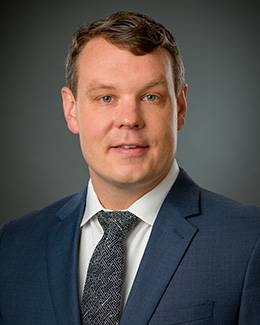With prostate cancer again in the news, RRH urologist discusses screening and treatment

The nation's defense secretary's treatment for prostate cancer has put the disease in the public spotlight again, and officials at Rochester Regional Health/United Memorial Medical Center had a specialist talk with reporters on Wednesday to help people better understand detection and treatment.
Lloyd Austin's struggle with prostate cancer and subsequent post-surgery infection led him to seek treatment without alerting the White House.
That, in itself, became a controversy, but as USAToday reports, many men are reluctant to discuss a prostate cancer diagnosis.
"I find that it's something that a lot of men don't talk about," Dr. Samuel Haywood, a urologist specializing in prostate cancer, says. "Men can be very stoic, and they don't like to talk about their health issues."
But facing up to prostate cancer can help men save their own lives, suggested Dr. Jacob Gantz, a urologist with RRH.
"It's crucial to be screened because by the time the disease, prostate cancer, would develop and cause symptoms, symptoms that the patient would be able to detect, it likely would be a very advanced disease and much more difficult to treat," Gantz said. "Catching prostate cancer early in its disease course makes the treatments much more effective. And it makes the treatments much more manageable and easier to do for the patient."
Screening consists of an annual PSA test (part of blood tests for an annual physical) and a digital rectal exam. Generally, men between 55 and 75 should be screened annually, but that can vary with family history. A man whose father, or a grandfather, uncle, or brother had prostate cancer is at greater risk of developing the disease. Black men are also at elevated risk for prostate cancer.
"Prostate cancer in its early stages doesn't cause any outward symptoms that a patient would be able to pick up on," Gantz said.
Treatment has evolved and improved over the years, and outcomes are often favorable, Gantz said.
"Treatment of prostate cancer is not one size fits all," Gantz said. "It depends on the patient's age, the stage of the cancer, potentially the degree of spread of the cancer. In some cases (standards of treatment include), watching the cancer, evaluating it over time with biopsies, as well as MRIs and other adjunctive tests to monitor the progression of cancer."
The cancer can sometimes be spot-treated in the prostate instead of treating the whole gland, Gantz said. That can help reduce the potential side effects of treatment.
Radiation treatment is also an option, he said.
If necessary, the prostate can be removed, called a radical prostatectomy. This is where advances in technology really make a difference, Gantz explained.
"Robotic-assisted removal of the prostate has kind of revolutionized the treatment of prostate cancer," Gantz said. "Before (robotics), the surgery was much longer. There was much higher blood loss, much more invasive, and it required a hospital stay for at least several days. Since the introduction of the robotic platform, the surgery has become minimally invasive. It usually requires only one night in the hospital and a catheter for a few days, and the recovery is much faster with good cancer outcomes as well. Long-term complications have also improved with the radical prostatectomy being done robotically, such as sexual side effects as well as incontinence due to leaking of urine, has improved as well. But that being said, despite it being minimally invasive, it is still a major surgery."
As with any major surgery, complications are rare, but also an ever-present risk. It was complications, reportedly an infection, that sent Austin back to the hospital on Jan. 1.
Gantz said he is, of course, not Austin's doctor, so has no specific information on his treatment or complications, but complications can include, he said, leaking urine (possibly the complication Austin struggled with, according to news reports), which can cause a bowel infection and for the bowels to not function properly.
"All of these complications, fortunately, as far as I can tell, from what I've read, are reversible and pretty easily reversible with no long-term damage," Gantz said.
Gantz emphasized that while prostate cancer is treatable, it takes a man to regularly see a primary care doctor to ensure it's detected early. Once discovered, the treatment strategy becomes a discussion for the patient and a urologist.
"Prostate cancer treatment really depends on the patient, the goals of the patient, their age, as well as their health status," Gantz said. "It's very important when deciding what treatments are right for a patient to have a dialogue with their urologist to weigh the pros and cons of each treatment and then, therefore, come to a conclusion about what's right for that patient."
